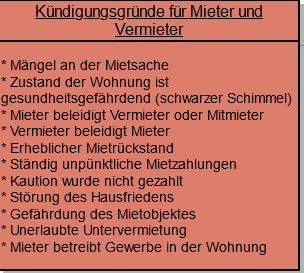Hanover Regional Court, 04.03.2015, Ref.: 19 S 88/14
Particularly in large cities, tenants often feel disturbed by noise from children in neighbouring flats. However, children's noise only ever entitles the tenant to terminate the lease and evict the tenant if this noise constitutes a culpable breach of contract by the tenant (i.e. the parents of the children).

This in turn means that children's noise only constitutes a culpable breach of contract on the part of the tenant if it goes beyond the normal (socially acceptable) level.
For example, landlords and co-tenants must tolerate noise disturbance from children if the noise disturbance can reasonably be seen to be the result of typical, age-related behaviour on the part of the children.
However, parents must also ensure that children observe the general quiet times and house rules.
In the judgement of the Regional Court of Hanover discussed here, the court had to decide on appeal whether children's noise, which was caused by the tenant's own and friends' children, went beyond the normal level and thus constituted a cancellation without notice justified.
Facts of the Case:
Landlady gave notice to tenant due to noise disturbance in a 6-family house
The plaintiff was the landlord, the defendant the tenant of a flat in a 6-family house. Due to noise disturbances at various times of the day and night, the plaintiff had given notice to the defendant and sued for eviction and restitution.
To this end, the defendant's co-tenants had drawn up noise logs over a period of more than six months, and the defendant had subsequently received several verbal and written warnings. After the defendant continued its behaviour despite the Cautions did not change, the plaintiff terminated the tenancy without notice due to massive disturbance of the domestic peace.
The noise came mainly from the children and the visiting children
The defendant in turn disputed the noise and argued that the noise was caused by visiting children and was socially acceptable. The local court first seised of the case ordered the defendant to vacate and surrender the property in accordance with the application.
Judgement of the Regional Court of Hanover:
Like the district court, the regional court also ruled that the cancellation was effective
The Hanover Regional Court followed the opinion of the Hanover Local Court and also ruled that the cancellation and thus the plaintiff's claim for eviction and surrender was justified.
The district court had given detailed and comprehensible reasons why it was convinced that the defendant had persistently violated the requirement of consideration in the apartment building and had persistently disturbed the peace of the house by frequently causing noise that went beyond what was reasonable.
The overall noise nuisance caused by the tenant had exceeded the acceptable level and the peace of the house had thus been permanently disturbed.
Contrary to the view of the defendant, it is also irrelevant whether the noise nuisance was caused by the tenant's own children or by other children. The tenant must also accept responsibility for the behaviour of her visitors, as she is obliged to ensure that they comply with her duty of consideration as a tenant.
The noise from the children had exceeded reasonable levels
Even children's noise, which is generally considered socially acceptable, can no longer be tolerated if the intensity, duration and timing of the noise exceeds what is reasonable, even taking into account children's urge to play and move around.
In any case, there were no concrete indications that the noise logs drawn up by the witnesses were incorrect at the time. Ultimately, it was also not a question of the "occasional visitor leaving the house late at night or the hoover being used late at night".
The noise logs documented a wide range of noise nuisances
The noise logs, which the witnesses had confirmed at the hearing, showed a large number of complex noise nuisances emanating from the defendant's flat. It was therefore no longer reasonable to expect the plaintiff to continue the tenancy.
Source: Hanover Regional Court
Important Note: The content of this article has been prepared to the best of our knowledge and belief. However, due to the complexity and constant evolution of the subject matter, we must exclude liability and warranty. Important Notice: The content of this article has been created to the best of our knowledge and understanding. However, due to the complexity and constant changes in the subject matter, we must exclude any liability and warranty.
If you need legal advice, feel free to call us at 0221 – 80187670 or email us at info@mth-partner.de.
Lawyers in Cologne provide advice and representation in tenancy law.




